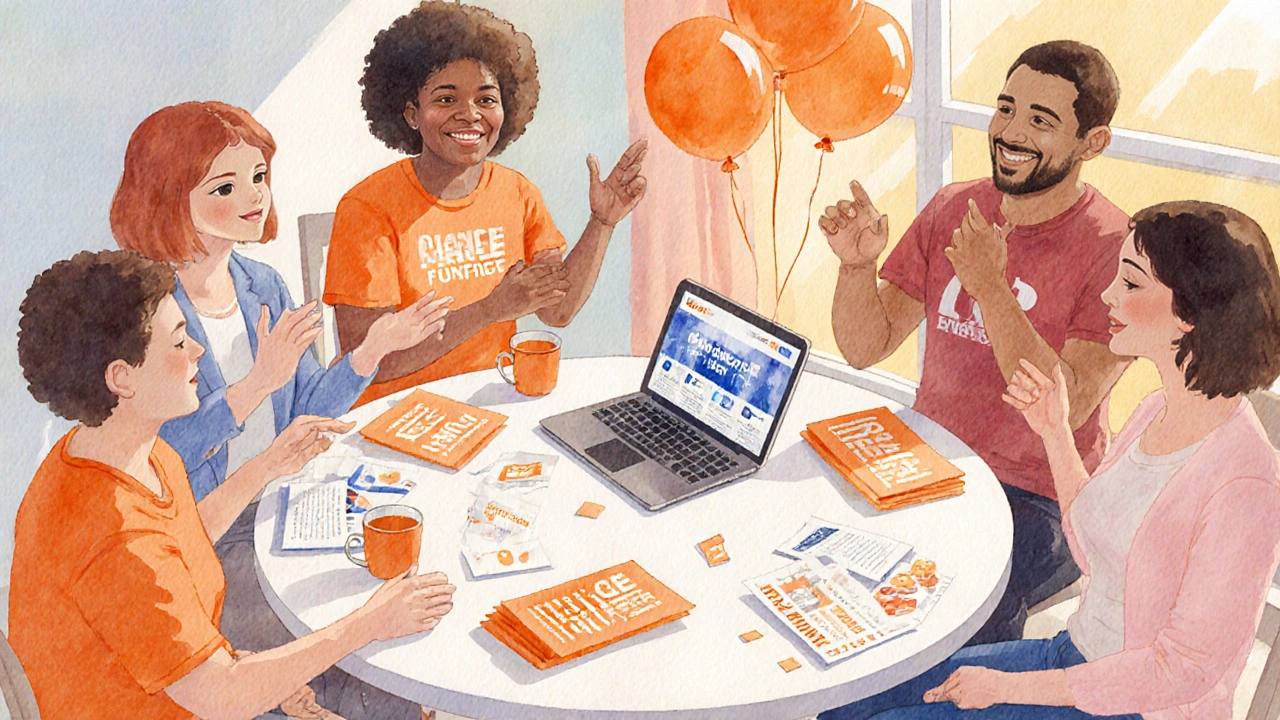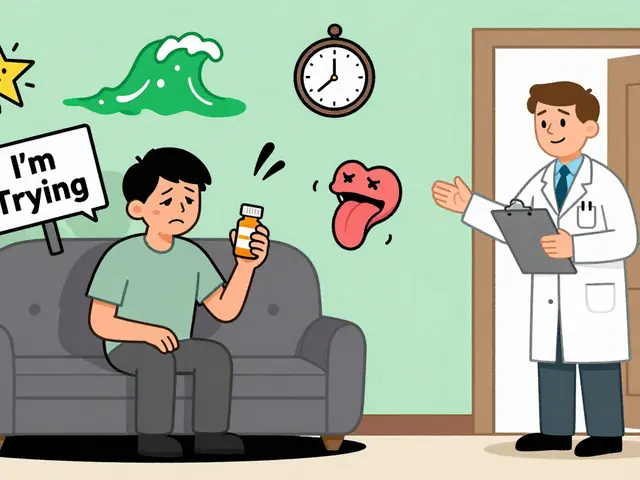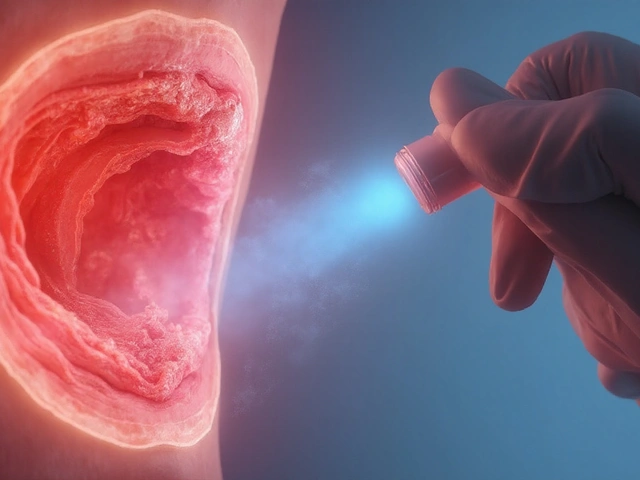Ovarian Cancer Symptom Checker
Early detection is crucial for improving survival rates. The National Health Service reports that over 65% of ovarian cancer cases are diagnosed at stage III or higher, when treatment is more difficult. This tool helps identify potential symptoms that should be discussed with a healthcare professional.
Symptom Assessment
Check all symptoms you're experiencing that have lasted longer than two weeks
Your Results
Key Takeaways
- October is the global ovarian cancer awareness window - a chance to educate, fundraise and advocate.
- Knowing the early symptoms and risk factors can save lives.
- There are ten practical ways you can make a difference, from donating to volunteering.
- Partnering with reputable charities and research funds maximises impact.
- Resources like support groups and genetic‑testing services are freely available in the UK.
Why October Matters
October is Ovarian Cancer Awareness Month, a global campaign that highlights ovarian cancer, educates the public, and raises funds for research and support services. The orange ribbon, the colour of ovarian cancer awareness, appears on storefronts, social media feeds, and community events worldwide. In the UK, the Ovarian Cancer Action reports that engagement spikes by 40% during this month, directly translating into more screening appointments and research grants.

Quick Facts About Ovarian Cancer
Understanding the disease sets the stage for meaningful action. According to the latest National Health Service cancer statistics (2024), about 7,500 women in the UK are diagnosed each year, with a five‑year survival rate of 46%-significantly lower than breast cancer. The biggest challenge is late detection; over 65% of cases are stageIII or higher at diagnosis.
Key risk factors include age (most common after 50), family history of BRCA gene mutations, and certain reproductive histories. Conversely, oral contraceptive use and tubal ligation have been shown to reduce risk by up to 30%.
Spotting Early Signs - What You Should Know
Early symptoms are subtle and often dismissed. The most reliable warning signs are:
- Persistent bloating or abdominal fullness.
- Quickly feeling full after a small meal.
- Pelvic or lower‑back pain that doesn’t go away.
- Changes in urinary frequency or urgency.
- Unexplained weight loss.
If any of these linger for more than two weeks, book an appointment with your GP. The NHS now offers a simple symptom checker and can refer you for a transvaginal ultrasound or CA‑125 blood test.
Ten Ways You Can Make a Difference
Everyone can contribute, whether you have a few minutes or a whole weekend. Below is a concise guide that turns intention into action.
| Action | Time Commitment | Typical Cost | Impact |
|---|---|---|---|
| Share a personal story on social media | 5minutes | £0 | Raises visibility, encourages others to seek help |
| Host an orange‑themed fundraiser | 1‑2weeks planning | £50‑£200 | Funds research and patient services |
| Volunteer with a local support group | 2‑4hours/month | £0 | Provides emotional aid to survivors |
| Donate to a reputable charity | Instant | Any amount | Directly finances trials and screenings |
| Participate in a clinical trial | Variable | £0 (may include travel reimbursements) | Accelerates new treatment development |
| Organise a workplace awareness session | 1‑hour | £0‑£20 (materials) | Educates peers, may prompt early screening |
| Buy orange merchandise | Minutes | £5‑£30 | Funds charity and spreads the orange ribbon |
| Sign a petition for better funding | Minutes | £0 | Influences policy and research budgets |
| Offer professional services (legal, marketing, IT) | Variable | Pro‑bono | Boosts charity capacity |
| Encourage genetic testing for at‑risk families | Conversation (10‑15minutes) | Free through NHS for eligible families | Identifies high‑risk individuals early |

Supporting Research and Clinical Trials
The Ovarian Cancer Research Fund, a UK‑based charity, has funded over 120 studies in the past decade. Each £100 donation can cover a lab technician’s day or purchase essential reagents. If you’re a scientist or health‑care professional, consider applying for a grant or collaborating on a study. The latest breakthrough involves PARP inhibitors, which have improved progression‑free survival by 23% for patients with BRCA mutations.
For non‑scientists, signing up for a clinical trial is simpler than you think. The UK Clinical Trials Gateway lists over 30 ovarian‑cancer‑related trials. Participation often only requires a few extra hospital visits and helps generate data that could lead to new therapies.
Connecting with Survivors and Caregivers
Emotional support is a cornerstone of the fight. The Ovarian Cancer Support Group Network hosts weekly virtual meetings and quarterly in‑person retreats in cities like London, Manchester and Exeter. Joining a group gives you real‑life stories, coping strategies, and a sense of community.
If you’re a caregiver, the Carer’s Hub offers free training on medication management, nutritional advice, and mental‑health resources. These services are funded by the NHS and partner charities, so they’re accessible at no cost.
Leveraging Social Media for Maximum Reach
A single post with the hashtag #OvarianCancerAwareness can reach thousands. Here’s a quick cheat‑sheet for an eye‑catching post:
- Start with a bold fact: "1 in 70 women will develop ovarian cancer".
- Add a personal or patient quote.
- Include the orange ribbon emoji 🟧 and a call‑to‑action (donate, share, sign up).
- Tag reputable charities like Ovarian Cancer Action.
Boost engagement by posting during peak times (8‑9am and 6‑7pm UK time) and pinning the post to your profile for the month.

Checklist for a Successful Fundraising Event
Whether you’re planning a bake‑sale, a charity run, or an online auction, follow this streamlined checklist:
- Set a clear financial goal (e.g., £1,000 for research).
- Choose a date in October and book a venue (community centre, park, Zoom).
- Secure sponsorships from local businesses; offer orange branding in return.
- Promote via social media, flyers, and local press.
- Prepare a thank‑you package (certificates, photos, impact report).
- After the event, share results and next steps with participants.
Even a small team of three volunteers can pull off a $500‑plus event with this approach.
Frequently Asked Questions
When does Ovarian Cancer Awareness Month start and end?
The campaign runs from 1October to 31October each year, aligning with the global orange‑ribbon movement.
What are the most common early symptoms?
Persistent bloating, early satiety, pelvic or lower‑back pain, urinary changes, and unexplained weight loss are the key warning signs.
Can men help raise awareness?
Absolutely. Men can share information, organize workplace fundraisers, and support female relatives in getting screened.
Is genetic testing covered by the NHS?
Yes, if you have a family history of ovarian or breast cancer, the NHS offers free BRCA testing through specialist clinics.
How do donations reach research projects?
Charities allocate funds to grant‑making bodies that award research grants based on peer review, ensuring money backs high‑impact studies.
Where can I find local support groups?
Visit the web portal of Ovarian Cancer Support Group Network and filter by postcode to see meetings near you.
Next Steps - Turn Awareness into Action
Pick one item from the table above today. If you have an hour, share a post; if you have a weekend, host a fundraiser. Small, consistent actions add up, and every orange ribbon strengthens the fight against ovarian cancer.
Remember, early detection saves lives, and community support fuels the research that will one day eradicate this disease. Your involvement matters now-especially during October.






11 Comments
What a superb initiative! 🎗️ October’s orange ribbon shines bright, and the comprehensive list of ten actions offers a clear roadmap for anyone eager to make a difference! From sharing personal stories to sponsoring clinical trials, each suggestion is grounded in practicality and compassion; the inclusion of cost estimates and time commitments further empowers volunteers! I especially appreciate the emphasis on genetic testing accessibility – a crucial, often overlooked preventive measure! Let’s all rally together, amplify awareness, and turn those orange ribbons into real‑world impact! 🙌
One might argue that the very notion of “awareness” is a double‑edged sword; it elevates visibility yet simultaneously risks commodifying suffering. While the author enumerates laudable actions, the underlying imperative remains: who benefits when the orange ribbon is paraded across storefronts? The true metric of success should not be the number of hashtags or bake‑sale dollars, but the measurable reduction in late‑stage diagnoses-a statistic that stubbornly resists simplification. Moreover, the reliance on voluntary fundraising perpetuates a fragile ecosystem where breakthroughs hinge on fickle public generosity. If we peel back the layers, we discover a systemic dependency on philanthropy that masks underfunded research pipelines. Thus, while the guide is undeniably helpful, it also subtly reinforces a status quo that could be challenged with more radical policy advocacy.
Thanks for the thoughtful critique! 🙏 Your points remind us that awareness must be paired with systemic change, and that every orange ribbon should symbolize tangible progress. To complement grassroots efforts, we can also lobby local representatives for increased NHS funding for early‑screening programs. Small steps, like sharing this guide and signing petitions, can collectively shift the narrative from charity to concrete action. Keep the conversation going, and let’s turn optimism into measurable outcomes.
Yo, love how the post breaks down the actions so clearly – makes it easy to pick one thing to do this October. If you’re short on time, even a quick social media share with the #OvarianCancerAwareness tag can spread the word fast. Also, hitting up your local community centre to ask about volunteer slots is a solid move. Keep it simple, stay consistent.
Totally agree, bro! 😊 Simple steps are the best way to get everyone involved. I’m planning to put up a small orange poster at my office and ask a mate to bring donuts for a mini fundraiser. That’ll create buzz without too much hassle.
Awareness works best when paired with early screening.
Sure, because nothing screams “effective intervention” like a weekend bake‑sale funded by overpriced cupcakes – the epitome of evidence‑based oncology, right?
It is utterly naïve to equate the proliferation of orange ribbons with any substantive advancement in ovarian oncology; such superficial symbolism merely placates the collective conscience while the underlying research infrastructure remains starved for genuine investment. The post’s checklist, though exhaustive in its enumerations, reduces a complex biomedical crisis to a series of feel‑good tasks that scarcely address the systemic barriers preventing early detection. One must question whether the true beneficiaries of these campaigns are the patients or the PR departments of charitable institutions desperate for brand visibility. In the grand scheme, token gestures are insufficient; we require a paradigm shift toward sustained governmental funding and rigorous clinical trial pipelines. Until then, any celebration of “awareness” is but a gilded veneer over entrenched neglect.
Feeling you on the over‑the‑top vibes – sometimes the hype can feel a bit much. Still, a few orange stickers don’t hurt, right? As long as they spark a convo, maybe it’s worth the noise.
Honestly, the post hits the nail on the head about needing more than just ribbons. We can channel that energy into lobbying for policy change – push for mandatory risk‑assessment protocols in primary care. That would be a real game‑changer beyond the usual charity runs.
The urgency of ovarian cancer awareness cannot be overstated; each October, the orange ribbon flashes across cities like a beacon, reminding us that countless women silently endure a disease that stealthily steals years of their lives. Yet, beyond the symbolism lies a stark reality: over two‑thirds of diagnoses occur at stage III or later, a statistic that haunts clinicians and families alike. Early detection, therefore, is not a luxury but a lifeline, demanding both public education and systemic reform. We must first empower individuals with knowledge of the subtle early signs-persistent bloating, early satiety, pelvic discomfort, urinary changes, and unexplained weight loss-so that they can seek medical counsel without delay. Simultaneously, healthcare systems must streamline referral pathways, ensuring that any flagged symptom triggers appropriate imaging and CA‑125 testing promptly. Community engagement plays a pivotal role; sharing personal narratives on social media can demystify the disease and encourage peers to speak up. Fundraising efforts, while valuable, should be strategically directed toward research that targets the molecular underpinnings of ovarian tumors, such as PARP inhibitors and novel immunotherapies. Moreover, governmental advocacy is essential: lobbying for increased NHS funding, subsidized genetic testing for high‑risk families, and support for clinical trial enrollment can accelerate breakthroughs. Volunteerism should not be limited to bake‑sales; professionals can donate expertise, from legal counsel to data analysis, amplifying the impact of charitable organisations. Educational workshops in workplaces can embed awareness into daily routines, turning the orange ribbon into a conversation starter rather than a decorative afterthought. Lastly, we must remember the emotional heft carried by survivors and caregivers; their stories are the heartbeats that humanise statistics. By weaving together education, research, policy, and compassion, we transform orange ribbons from fleeting symbols into enduring catalysts for change.
Write a comment